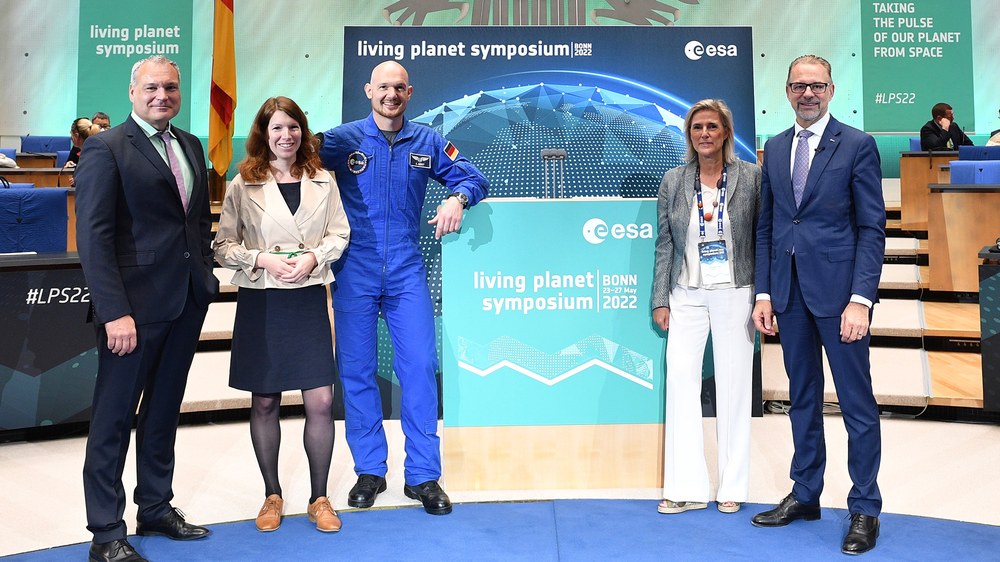Taking the pulse of our planet



- The German Space Agency at DLR is co-hosting the ESA Living Planet Symposium, which will take place for the first time in Germany from 23–27 May 2022. The theme of this year’s symposium is 'Taking the pulse of our planet from space'.
- More than 4700 Earth observation experts from around the world will meet at the World Conference Center (WCCB) in Bonn.
- The event will focus on the role of satellite-based Earth observation in addressing global challenges such as climate change, a sustainable economy and food security.
- There will also be a supporting programme to engage the public and schools.
- Focus: Space, Earth observation, climate protection, sustainability
Measuring biomass, observing the world’s oceans, improving agricultural sustainability, surveying and improving air quality, documenting ice melt at the poles and developing countermeasures, using satellites for climate and crisis management, the economic impact of Earth observation and its role as a catalyst for technological progress – these are among the long list of topics on the agenda at the Living Planet Symposium. Organised by the European Space Agency (ESA) and co-hosted by the German Space Agency at DLR, this year's symposium will run from 23–27 May 2022 and marks the first time that the event has been held in Germany.
Using satellites to observe Earth from space provides the essential foundation for ongoing, active environmental and climate monitoring and the measures for global and regional environmental and climate protection they enable. Over 4700 participants from 74 countries, including more than 820 students, 40 exhibitors and 240 scientific sessions, will flock to the city of Bonn to spend a week at one of the world's largest specialist conferences on Earth observation. The German Space Agency at DLR, which coordinates Germany's contribution to ESA on behalf of the German government, is based here, as are various UN secretariats focusing on environmental and climate issues.
"Germany is a world leader in the development and application of Earth observation technologies," says Walther Pelzer, Member of the German Aerospace Center (Deutsches Zentrum für Luft- und Raumfahrt; DLR) Executive Board and Head of the German Space Agency at DLR. "The symposium is an excellent opportunity for international exchange among experts on the global challenges that affect us all, such as climate protection, food security and the implementation of sustainable technologies, which we can tackle in a more focused way with the help of Earth observation. We want to seize this opportunity to locate important environmental and climate policy targets at national and international levels. It is about protecting Earth, but also about protecting space, with a particular focus on the space pollution resulting from humankind’s increasing commercial use of space."
"Germany is the strongest financial partner in European Earth observation, in terms of its contribution to ESA and the programmes of the European Commission, such as Copernicus. We want to continue this focus at the next ESA Council at Ministerial Level in Paris in November 2022," says Anna Christmann, Federal Government Coordinator of German Aerospace Policy, at the opening of the Living Planet Symposium in Bonn. “Observing our planet and understanding how it is changing is more important than ever. Germany will continue to be a dependable partner in Earth observation going forward. Space agencies, industry, the science sector and institutional and commercial users can all rely on us. Against this backdrop, I would particularly recommend a visit to the ‘Space4ourPlanet’ exhibition, which shows how spaceflight and the UN's sustainability goals go hand in hand."
"The Living Planet Symposium has become one of the most important conferences in the field of Earth observation," says ESA Director General Josef Aschbacher. "Thanks to the Sentinel satellites of its Copernicus programme Europe provides the most accurate observations of our planet today. Earth and environmental observation are blind to borders. Together we must make every effort to better understand climate change, for the benefit of future generations within Europe and across the world. ESA's Earth observation programme provides a globally renowned cornerstone for these endeavours."
Katja Dörner, Mayor of Bonn, adds: “Bonn isn’t just the city in which the United Nations have pooled their efforts towards achieving the global sustainability goals, but also a centre for Earth observation. Areas of research such as disaster forecasting, weather monitoring, agricultural sustainability, biodiversity and education for sustainable development are addressed by outstanding scientific and research organisations, public institutions and companies. The Living Planet Symposium brings everyone together and focuses on the future we want to ensure for generations to come."
The supporting programme running alongside the Living Planet Symposium includes the 'Space4ourPlanet' travelling exhibition, sponsored by the United Nations. Interested parties can view the exhibition outside the WCCB. There is also a DLR_School_Lab with over 400 registered attendees (by appointment only), which presents remote sensing technologies and techniques in a format that is accessible to children and young people. The German Space Agency at DLR also has a stand at which you can examine climate zones with satellite images. Two exhibits from the INNOspaceEXPO will be on display, on the theme of knowledge and education. The school lab will be open to families with children aged eight and over on the mornings of 26 and 27 May.
The Federal Ministry of Food and Agriculture has worked with the German Space Agency at DLR to organise an event on 'Earth observation and agricultural applications', including food security, on 24 May. On 25 May 2022 – 'Climate Day' at the LPS – ESA astronaut Luca Parmitano will give a talk on his expedition to the Gorner glacier, once the third-largest glacier in the Alps, which has melted significantly due to climate change.
For more information, see: Living Planet Symposium 2022.
